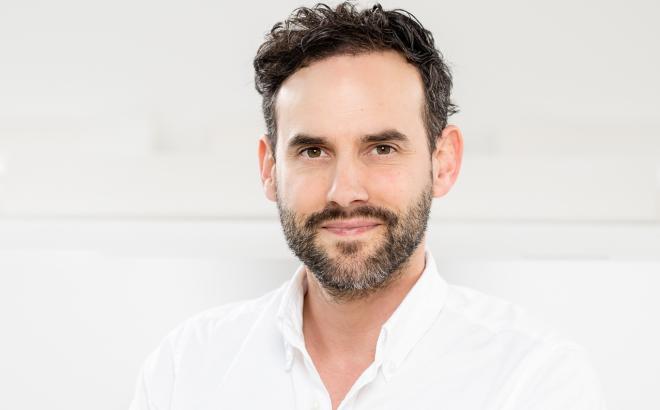A podcast (in German) from the Österreichische Gesellschaft für Allgemeinmedizin includes several contributions from Prof. Rubeis:
Giovanni Rubeis, Medical Ethicist and Philosopher
Medical ethics: Exploring current issues in real time
Two years ago, Karl Landsteiner University of Health Sciences established the Division of Biomedical and Public Health Ethics and appointed Prof. Giovanni Rubeis to lead it. With his multidisciplinary team, Rubeis researches how digitalisation and artificial intelligence are transforming medicine and examines the ethical implications of this transformation.
“Ethical issues in medicine are not factors introduced from outside the field; they are always the result of medical professionals’ actions. Awareness of this fact and willingness to engage with the topic have grown steadily over the last 10 years,” says Prof. Giovanni Rubeis, Head of the Division of Biomedical and Public Health Ethics, which is part of the Department of General Health Studies at Karl Landsteiner University of Health Sciences. “The fact that ethical values and decisions crop up time and again is not only central to my research, it’s also something I share with my students in their first lectures. And, as it happens, many students come back to me after completing practical courses in hospitals or because they want to engage with ethics in medicine in more detail in their thesis project.”
A radical disruption in medical practice
Rubeis began to examine the issue of digitalisation in medicine seven years ago. He was among the first experts in the German-speaking world to research the ethical implications of these new technologies. “I realised that this development is about much more than just technical tools. Artificial intelligence is creating a radical disruption in medical practice, structures and relationships.” The researcher has written a book dedicated to precisely these future-focused topics: Ethics of MedicalAI will be published by Springer Verlag in 2024. For the present Rubeis believes there is no issue more pressing than dealing with the digital transformation.
Multidisciplinary research team
After studying in Vienna and then obtaining his doctorate in Tübingen, Giovanni Rubeis conducted research at several German universities. He qualified as a professor in Heidelberg before being offered the opportunity to establish his own division at Karl Landsteiner University of Health Sciences. While there are two other professorships in Austria focusing on medical ethics, the KL division’s focus on digitalisation makes it unique – as does its multidisciplinary composition. “We are a diverse team, incorporating wide-ranging expertise from the fields of philosophy, ethics, social sciences, medicine, public health and care. This is necessary, in our view, given the highly complex subject matter and because it is always vital to consider ethical aspects in the development and use of technology.”
In Rubeis’ opinion, ethical issues are likely to grow in number, not only because healthcare and technology are becoming increasingly complex but also due to the composition of society. “Nowadays, there is a growing trend in which people are less willing to leave decisions about their health to doctors alone. This also presents new challenges for medical professionals, as it forces them to balance their duty of care against the will of the patient. In this context, ethics also provides a sense of confidence, a guide in how professionals can work in this field of tension.”
A more inclusive view of people and technology
“Automation and artificial intelligence are not passive tools: to a certain extent, they serve as non-human actors,” explains Rubeis. “We still haven’t found an effective way to handle this. Developments are advancing by leaps and bounds and, of course, there’s the question of who bears liability when a human delegates tasks to machines.” There are, however, very good reasons why artificial intelligence can never replace a human. “These technologies use statistical methods and are fed with vast amounts of data in order to identify correlations. What they don’t have is the human ability to determine causality.” When it comes to ethical issues, Rubeis explains, the task is to get to grips with them – which is actually the aim of artificial intelligence. “If we view technologies as auxiliary, more precise means of providing treatment and completing processes for the benefit of patients’ well-being, we won’t have to grapple with the dichotomy between people and machines, and can instead think more inclusively about how humans and technology can work together. I would very much like to see that in the future.”
Giovanni Rubeis describes himself as a curious, solution-oriented researcher. The most challenging part of his work, he says, is trying to combine different roles. “I’m a researcher, a university lecturer, a project leader, and also have to devote time to securing top-up funding, working on committees, providing leadership and engaging in scientific communication. That said, the variety makes it all very exciting.” Besides the international acclaim for his publications and research projects, Rubeis says his greatest successes include collaborations with his students and receiving positive student feedback.





